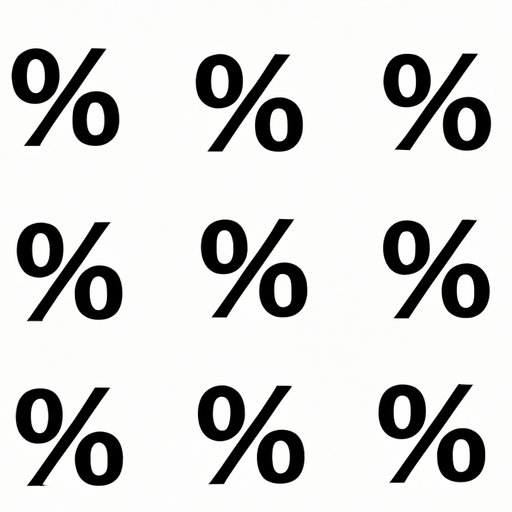
I. Introduction
In our daily lives, we often come across the term “percent”. It is used in various fields like finance, shopping, discounts, discounts, and grades. Percent demarcates a numerical value when it comes to something expressed in relation to 100. It is an important concept to understand as it affects our daily life, which is where the conversion of percent to fraction plays a crucial role.
Converting percent to fraction is a vital skill to have as it is needed in various applications. This article will help you understand the process to convert percent to fraction efficiently.
II. Visual Aids for Understanding
When learning a new concept, visual aids can go a long way in helping us understand the material better. Visual aids create a representation of a concept to quickly communicate its meaning.
When it comes to converting percent to fraction, there are numerous visual aids that can be employed to help learners understand the process. Diagrams and illustrations are excellent tools that can take a complex concept and simplify it for learners.
III. Step-by-Step Guide
The process for converting percent to fraction can be broken down into steps to make it easier to understand. Follow these steps:
- Write the percent as a fraction with a denominator of 100
- Reduce the fraction
- Convert to mixed number or whole number
For example, if you have 20%, write it as 20/100
Find any common factors that the numerator and denominator share, and divide them out to simplify the fraction.
For example, 20/100 can be simplified to 1/5 by dividing both the numerator and denominator by 20.
Based on your requirement, you can convert the fraction to a mixed number or whole number.
With these three steps, you should be able to convert percent to fraction with ease.
IV. Real-Life Examples
Understanding how to convert percent to fraction can have practical applications in everyday life. For instance, consider determining the amount of money saved on a sale. Let’s say there is a 20% discount on a product that usually costs $100.
To calculate the amount saved, we can convert the percent to fraction:
- 20% to a fraction: 20/100
- Reduce the fraction: 20/100 = 1/5
- Multiply the reduced fraction by the original value of the product: $100 x (1/5) = $20
The customer is able to save $20 on the product, which is 20% of the original price. Learning how to convert percent to fraction can be a real money-saver!
V. Practice Problems
Practice is necessary to reinforce any skill. Therefore, it’s vital to provide readers with practice problems to cement their understanding of converting percent to fraction. Here are a few examples:
- Convert 10% to a fraction
- Convert 75% to a fraction
- Convert 235% to a fraction
- Convert 1.25% to a fraction
By practicing these problems, readers will become more confident with converting percent to fraction, and be ready to apply this skill in their everyday life.
VI. Tips and Tricks
Here are a few tips and tricks you can use that will make the conversion process easier:
- Cancelling out common factors
- Use multiples of 10
When dividing both the numerator and denominator by common factors, the fraction becomes smaller and much easier to work with. For example, to reduce 20/100 to 1/5, we can divide 20 by 20 and 100 by 20, thereby cancelling out the common factor (20).
Since a percent is a ratio of part to whole, it can easily be converted to a fraction with a denominator of 100 as a percentage is essentially a number out of 100.
VII. Additional Resources
There are many resources available on the internet that can help you get a better understanding of converting percent to fraction. Here are a few types of resources that can be useful:
- Worksheets – for additional practice
- Videos – for visual learners
- Articles – for a more in-depth exploration of the concept
VIII. Conclusion
Converting percent to fraction is a crucial skill for everyday life. In this article, we have learned the step-by-step process of converting percent to fraction. We’ve also looked at the importance of visual aids in understanding concepts, real-life examples of its practical application, practice problems, tips and tricks to make conversion easier, and additional resources for further learning. By practicing these skills, readers will be more confident in their ability to convert percent to fraction and see its benefits in their daily life.





